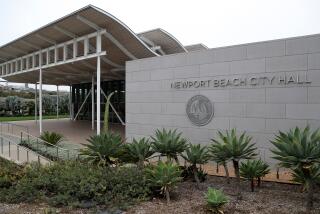W. Hollywood Coalition May Hold the Key to City Council Election
- Share via
From behind a stack of papers in his cluttered office at Crescent Heights Methodist Church, Larry Gross does not look the part of West Hollywood’s most commanding power broker.
Yet, bolstered by an unlikely combination of young activists and elderly Jewish tenants, his Coalition for Economic Survival claims the allegiance of enough voters to make or break political candidates in a city where 87% of the electorate are renters.
In four years the coalition has transformed itself from an obscure Los Angeles-based fringe pressure group into West Hollywood’s most potent political power bloc, and observers say its political stock has never been higher.
West Hollywood’s rent control law is among the strictest anywhere, and three of five members of the City Council--including Abbe Land, who faces reelection in April--also sit on the coalition’s 25-member steering committee.
Even its harshest critics acknowledge that a coalition endorsement is tantamount to 2,000 votes, which could spell victory for a candidate with at least a modicum of support in other segments of the community.
Given such clout, the coalition stunned some observers when it chose not to try to capture a fourth council seat after Mayor Alan Viterbi’s surprise announcement two weeks ago that he will not seek reelection.
Rumors of a coalition-supported “heavyweight” entering the contest began to permeate West Hollywood political circles almost from the moment Viterbi opted out of the race. They persisted throughout the five days between his announcement and an extended candidate filing deadline.
Gross, who acknowledged that there was “some informal discussion” among steering committee members about whether another one of their own should enter the race, said the group decided instead “to focus all of our energies toward seeing that Abbe is reelected.”
Others saw the decision as a measure of the group’s unprecedented strength.
“I think they consider Abbe to be pretty much of a shoo-in, which would enable them to retain a three-seat majority,” said F. Peter Freed, who has been a coalition foe. “Besides that, they may have also worried about appearing too greedy.”
Two Seats at Stake
Of the four candidates besides Land seeking the two at-large council seats in the April 12 election, none is considered to have the kind of credentials capable of setting coalition hearts aflutter.
Ruth Williams, a community activist who was once a coalition member, had a falling out with the group four years ago. Teresa Garay, a public relations executive with a television station, is a political newcomer largely unknown in the community. Steve Michael, the publisher of a twice-monthly newspaper, is a strident critic of the coalition.
That leaves Paul Koretz, who observers agree may have the best chance of receiving coalition backing, but that appears to be uncertain.
Koretz is a protege of Viterbi, who, despite being on the coalition’s slate in the city’s inaugural election in 1984, has received only lukewarm reviews from the organization.
The steering committee met last week to discuss the council race, and took a decidedly cautious approach about endorsing anyone.
“We basically discussed the procedures whereby if (any of the other candidates) want to seek our endorsement, and their background has been consistent with our objectives, we will arrange to hear what they have to say,” said Gross, the coalition’s executive director.
Times were not always so good for the group whose leader used to be accused regularly of being a Communist, and whose loyal band of mostly elderly tenants concerned with rent control have often been derisively referred to as “one-issue zombies.” At one point, opponents even tried to pressure the Methodist church to evict the coalition from its office space.
Business Group
Things got better two years ago when coalition members Helen Albert and John Heilman defeated eight other candidates by a wide margin to win seats on the City Council. Three of the beaten candidates had the backing of a business group organized to challenge the coalition’s strength.
The business group, West Hollywood for Good Government, quickly faded into oblivion. Another organization, a political action committee formed by the Chamber of Commerce to reduce the coalition’s influence, had suffered a similar fate earlier.
Largely owing to such triumphs, critics frequently cite the coalition’s “arrogance,” but Gross and other members prefer to call it “self-confidence.” They point to the group’s strong track record in West Hollywood’s brief political history.
The coalition’s majority on the council has meant ample appointments to the city’s various commissions for the group’s volunteer members. A few have been hired for policy-making posts in the city’s bureaucracy.
But the real measure of the coalition’s strength in the predominately liberal city has been at the polls.
“Business leaders in the community are essentially Republican, conservative, or don’t live in the city, so they aren’t in a position to run strong political campaigns, plus they’ve also usually been tied in with landlord interests,” said Ron Stone, who led the city’s incorporation effort.
“In a city with so many renters, it isn’t difficult to figure out how the CES has managed to enhance its strength. . . . We appear to have reached the point where (that strength) is largely going unchecked,” he added.
Indeed, just as surprising as the coalition’s decision not to field a new candidate was the fact that the business community did not put forward a candidate of its own after Viterbi’s announcement.
‘Damn Hard Call’
The business community’s decision “was a damn hard call,” said Tony Melia, president of the West Hollywood Chamber of Commerce.
“But it would be stretching it to say we were somehow intimidated by the CES’ strength. It was just too late, given the lateness of Alan’s announcement,” Melia said.
Some business leaders were upset over Viterbi’s decision to bow out of the race at the last minute and endorse Koretz, privately insisting that had he made his intentions known earlier they would have chosen their own candidate.
“I understand why he did it, to help his friend Paul (Koretz), and I don’t blame him for it, but it didn’t help us any,” said landlord leader Grafton Tanquary, who heads West Hollywood Concerned Citizens.
But other business leaders seemed to echo the opinion of observers who insist that the business community has largely “abandoned the playing field” because of the coalition’s clout.
“I know why I didn’t run,” said Tom Larkin, a real estate broker who finished fifth in 1986.
“The second you run, and you say the word real estate, then you’re automatically branded as hating tenants. The CES has a very strong following, and they make sure that message gets out,” he said.
Councilman Steve Schulte, who narrowly won election without coalition backing in 1986, is a notable exception to the maxim that, in West Hollywood, a candidate cannot win without coalition support. But even he does not take the group’s influence lightly.
“You don’t have to have their support to be elected, but if you do have it, you’re virtually guaranteed a seat on the council,” he said. “That’s why what they do is always going to be important.”
More to Read
Sign up for Essential California
The most important California stories and recommendations in your inbox every morning.
You may occasionally receive promotional content from the Los Angeles Times.










